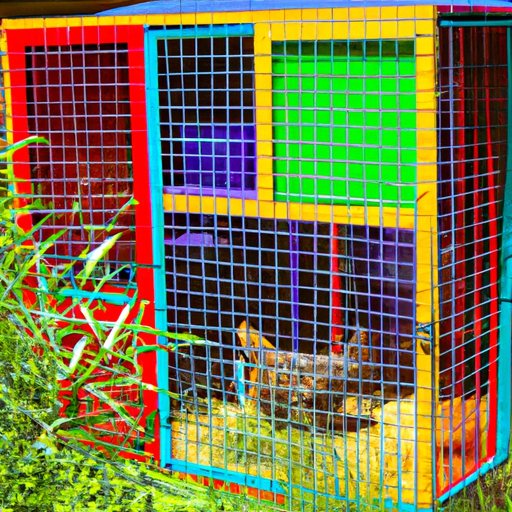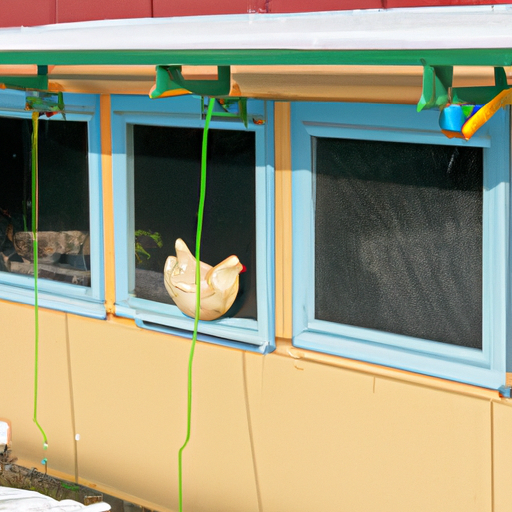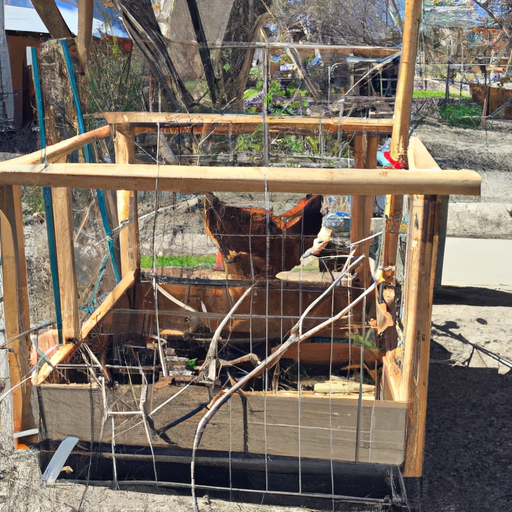Are you curious about the legal regulations surrounding the keeping of chickens in urban areas? Whether you’re eager to become a backyard chicken enthusiast or simply interested in exploring this popular trend, it’s crucial to understand the rules that govern such practices. This article will provide you with an overview of the legal framework surrounding urban chicken-keeping, ensuring that you’re well-informed and prepared to embark on this feathered adventure.
Zoning Laws
Definition of Urban Areas
In order to understand the legal regulations surrounding keeping chickens in urban areas, it is important to first define what constitutes an urban area. Urban areas are typically characterized by a high population density, developed infrastructure, and a mixture of residential, commercial, and industrial land uses. The precise definition of an urban area may vary from region to region and is typically established by local government authorities.
Residential Zoning
Residential zoning is a common land use designation within urban areas. It is intended for the development of housing and typically restricts or prohibits certain activities that may be incompatible with residential living. The specific regulations pertaining to keeping chickens in residential zones will depend on the local ordinances and zoning laws of each jurisdiction.
Agricultural Zoning
Agricultural zoning, on the other hand, is designated for farming and other agricultural activities. This zoning classification is typically found in rural areas, but some urban areas may have designated zones for agriculture as well. These zones may have more lenient regulations regarding the keeping of chickens and other livestock, compared to residential zones.
Mixed-Use Zoning
Mixed-use zoning is a land use classification that allows for the integration of various land uses, such as residential, commercial, and industrial, within the same area. In some cases, mixed-use zoning may permit the keeping of chickens in certain residential or commercial areas, as long as certain conditions are met. These conditions could include noise regulations, odor control measures, and compliance with other health and safety requirements.
Municipal Ordinances
Permit Requirements
Many municipalities have specific permit requirements that must be met before keeping chickens in urban areas is allowed. These permits often require individuals or households to fill out an application, pay a fee, and meet certain criteria, such as maintaining a specific distance from neighboring properties or having a suitable chicken coop design. It is important to consult with the local government or zoning department to determine the specific permit requirements in your area.
Number of Chickens Allowed
Another aspect regulated by municipal ordinances is the number of chickens allowed on a property within an urban area. This limitation helps to ensure that individuals are keeping a reasonable number of chickens that can be properly cared for and that the welfare of the animals is maintained. The specific limits on the number of chickens allowed may vary depending on the size of the property and the zoning regulations in place.
Coop Placement and Design
Municipal ordinances often include regulations pertaining to the placement and design of chicken coops in urban areas. These regulations are designed to ensure that chicken coops are structurally sound, sanitary, and aesthetically compatible with the surrounding neighborhood. For example, there may be requirements for setbacks from property lines, coop size limitations, or specifications for ventilation and lighting.
Distance from Neighbors
Concerns about noise, odor, and other potential nuisances associated with keeping chickens often prompt municipal ordinances to establish minimum distances that must be maintained between chicken coops and neighboring properties. These distance requirements are intended to mitigate any negative impacts on the neighboring residents and balance the interests of chicken owners with those of the broader community.
Noise Regulations
Noise regulations are an important aspect of municipal ordinances relating to chicken keeping in urban areas. These regulations typically include measures to prevent excessive noise caused by roosters crowing, which can disturb nearby residents. Depending on the jurisdiction, roosters may not be allowed in urban areas, or specific restrictions on their ownership and keeping may be in place to minimize noise disturbances.
Odor Control
To address concerns about potential odor issues, municipal ordinances may also include provisions for odor control when keeping chickens in urban areas. This may include requirements for proper manure management, regular cleaning of chicken coops and surrounding areas, and the use of appropriate bedding materials and litter to minimize odors.
Manure Management
Effective manure management is crucial for maintaining a healthy and desirable environment when keeping chickens in urban areas. Municipal ordinances may require specific guidelines for the proper storage, composting, and disposal of chicken manure to prevent contamination of nearby water sources, minimize odor, and reduce the risk of attracting pests.
Slaughtering and Processing
Municipal ordinances may also address the slaughtering and processing of chickens in urban areas. In some cases, these activities may be prohibited entirely to maintain the peace, safety, and well-being of the community. If slaughtering and processing are allowed, there may be additional regulations governing the method and location of these activities to ensure compliance with health and safety standards.
Health and Safety Regulations
Disease Prevention
Health and safety regulations pertaining to chicken keeping in urban areas often include measures to prevent the spread of diseases among chickens and from chickens to humans. This can involve requirements for vaccination programs, regular veterinary inspections, and biosecurity measures to minimize the risk of disease transmission.
Biosecurity Measures
Biosecurity measures aim to prevent the introduction and spread of diseases within a flock of chickens or between different flocks. These measures may include protocols for cleaning and disinfecting equipment, restricting access to the flock, and monitoring for signs of illness. By implementing effective biosecurity practices, chicken owners can help protect the health and well-being of their flock and prevent the potential spread of diseases to other birds or humans in urban areas.
Vaccination Requirements
Vaccination requirements are often an essential component of health and safety regulations for chicken keeping in urban areas. Vaccinations are crucial for protecting chickens from common diseases and reducing the risk of outbreaks. Municipal ordinances may specify the required vaccinations and the recommended schedule for administering them.
Food Safety Standards
Food safety standards are important considerations when keeping chickens in urban areas, particularly if the chickens are being raised for eggs or meat intended for human consumption. Municipal ordinances may set specific standards for hygiene, cleanliness, and proper handling of eggs and meat products to ensure food safety and reduce the risk of foodborne illnesses.
Inspections and Permits
To enforce health and safety regulations, municipal ordinances may require periodic inspections of chicken coops and facilities in urban areas. These inspections help identify any health hazards, compliance issues, or potential risks to the chickens, neighboring properties, and the broader community. Permits may also be required to ensure that chicken owners meet all necessary health and safety requirements before keeping chickens in urban areas.
Property and Neighbor Rights
Property Ownership
Understanding property ownership rights is crucial for those considering keeping chickens in urban areas. It is important to determine whether you own the property outright or are subject to any restrictions, such as zoning regulations, deed restrictions, or the rules and regulations of a homeowners association. These factors can impact your ability to keep chickens and the specific regulations you must comply with.
Nuisance Laws
Nuisance laws play an important role in regulating potential disturbances caused by chicken keeping in urban areas. These laws typically address noise, odors, and other potential nuisances that may impact neighboring properties. By adhering to noise regulations, implementing odor control measures, and maintaining good neighborly relations, chicken owners can help minimize the risk of legal issues arising from nuisance complaints.
Property Devaluation
One concern often raised by opponents of urban chicken keeping is the potential impact on property values. While studies have shown that well-maintained and responsibly kept chickens are unlikely to significantly devalue neighboring properties, it is still important to be considerate of the concerns and perceptions of the community. This includes adhering to all relevant regulations and maintaining a clean and aesthetically pleasing environment for both the chickens and the neighborhood.
Legal Actions
In the event of non-compliance with regulations or disputes with neighbors, legal actions may be taken against chicken owners. Violations of zoning laws, nuisance complaints, or failure to meet health and safety regulations can potentially result in fines, penalties, or even the confiscation of chickens. It is essential to familiarize yourself with the legal implications of keeping chickens in urban areas and to address any concerns or issues in a timely and responsible manner.
Community and Homeowners Associations
Restrictive Covenants
In some urban areas, properties may be subject to restrictive covenants imposed by community or homeowners associations. These covenants often dictate rules and regulations regarding land use, architectural design, and activities permitted on the property. It is important to review any restrictive covenants before considering keeping chickens in urban areas to ensure compliance and avoid potential legal consequences.
Association Bylaws
Association bylaws outline the rules and regulations that govern the activities of community or homeowners associations. These bylaws can include provisions that restrict or regulate the keeping of chickens in urban areas. It is crucial to familiarize yourself with these bylaws and seek any necessary approvals or waivers before embarking on chicken keeping within a community or homeowners association.
Prohibited Livestock
Community or homeowners associations may have specific prohibitions regarding the keeping of certain types of livestock in urban areas. Chickens may be included in these prohibited livestock lists, or there may be limitations regarding the number of chickens allowed or specific conditions that must be met. It is important to consult the association bylaws to understand whether or not chickens are permitted and what restrictions may apply.
Special Exemptions or Programs
Urban Agriculture Initiatives
In recent years, many urban areas have embraced urban agriculture initiatives, which aim to promote sustainable food production within city limits. These initiatives may include special exemptions, programs, or incentives for individuals interested in keeping chickens in urban areas. Such programs may provide resources, guidance, and support to ensure that chicken keeping is done in a responsible and sustainable manner.
Backyard Chicken Programs
Backyard chicken programs are becoming increasingly popular in urban areas as they provide a framework for responsible chicken keeping. These programs often involve educational workshops, resources on coop design and maintenance, and opportunities to connect with other chicken enthusiasts in the community. They can be a valuable resource for those interested in keeping chickens in urban areas, providing guidance and support to ensure both the welfare of the chickens and the harmony of the neighborhood.
Pilot Projects
Some municipalities may establish pilot projects to explore the feasibility and impact of allowing chicken keeping in urban areas. These projects often involve designated areas within the city where individuals or households can keep chickens under specific conditions. By closely monitoring these pilot projects, local government authorities can assess the benefits and challenges of urban chicken keeping and make informed decisions regarding future regulations and initiatives.
Animal Welfare Laws
Minimum Care Standards
Animal welfare laws provide guidelines and standards for the care and treatment of animals, including chickens kept in urban areas. These laws typically stipulate the minimum requirements for providing chickens with appropriate shelter, food, water, and veterinary care. It is important for chicken owners to familiarize themselves with these laws and ensure that they are providing their chickens with adequate care and meeting the minimum standards of animal welfare.
Housing Requirements
Housing requirements for chickens are an essential aspect of animal welfare laws in urban areas. These requirements include ensuring that the chicken coop provides adequate space, proper ventilation, and protection from the elements. Additionally, coop design should allow for ease of cleaning and maintenance to promote the overall health and well-being of the chickens.
Access to Food and Water
Ensuring that chickens have access to a balanced, nutritious diet and clean, fresh water is a fundamental aspect of animal welfare laws. Chicken owners in urban areas must ensure that their chickens are provided with a suitable feeding and watering system that meets their nutritional needs and keeps them hydrated.
Protection from Weather
Chickens in urban areas must be protected from extreme weather conditions, such as excessive heat, cold, or precipitation. Animal welfare laws often require chicken coops to have appropriate insulation, ventilation, and bedding to provide a comfortable and safe environment for the chickens throughout the year.
Veterinary Care
Animal welfare laws may also require chicken owners in urban areas to provide their chickens with regular veterinary care. This includes routine vaccinations, parasite control, and prompt treatment of any illnesses or injuries. Regular veterinary check-ups are important for monitoring the health of the chickens and ensuring their overall well-being.
Educational and Training Requirements
Chicken Husbandry Education
Educational programs dedicated to chicken husbandry are valuable resources for those interested in keeping chickens in urban areas. These programs provide information on the basics of chicken care, coop design, flock management, and other essential aspects of responsible chicken keeping. By participating in these educational opportunities, individuals can acquire the necessary knowledge and skills to ensure the health and welfare of their chickens.
Training Workshops
Training workshops offered by local government authorities, agricultural extension offices, or community organizations can provide valuable information and practical skills to individuals interested in keeping chickens in urban areas. These workshops may cover topics such as coop construction, proper feeding and watering techniques, disease prevention, and other relevant aspects of chicken care. Attending these workshops can help individuals feel more confident and prepared as they embark on their chicken-keeping journey.
Certification Programs
Some regions may offer certification programs specifically for chicken owners in urban areas. These programs typically involve more in-depth training and education and may require participants to pass a test or fulfill certain criteria to obtain certification. Certification programs can provide individuals with a higher level of expertise and recognition, demonstrating their commitment to responsible chicken keeping and adherence to all relevant regulations.
Enforcement and Penalties
Code Enforcement Division
Many municipalities have a code enforcement division tasked with ensuring compliance with local regulations, including those related to chicken keeping in urban areas. Code enforcement officers are responsible for conducting inspections, responding to complaints, and enforcing the relevant ordinances and regulations. They play a critical role in upholding the standards and ensuring that all chicken owners in urban areas are following the established guidelines.
Violation Notifications
When violations of regulations or ordinances related to chicken keeping in urban areas are identified, code enforcement officers may issue violation notifications to the responsible parties. These notifications typically outline the specific violations, provide a timeframe for compliance, and explain the potential consequences if the violations are not rectified within the given timeframe.
Fines and Penalties
Violations of regulations surrounding chicken keeping in urban areas can result in fines, penalties, or other enforcement actions. The specific fines and penalties vary depending on the jurisdiction and the nature and severity of the violation. It is essential for chicken owners to understand their responsibilities and adhere to all applicable regulations to avoid penalties and legal consequences.
Possible Confiscation
In extreme cases of non-compliance or repeated violations, municipal authorities may have the power to confiscate chickens kept in urban areas. Confiscation is a last resort measure and is typically employed when the welfare of the chickens is at risk or when there is a substantial violation of the regulations that cannot be rectified. It is imperative for chicken owners to fully understand and comply with all relevant regulations to maintain the well-being of their flock and avoid the potential loss of their chickens.
Public Opinion and Advocacy
Community Surveys
Community surveys play an important role in assessing public opinion on issues related to keeping chickens in urban areas. These surveys can help gauge the level of support or opposition and provide valuable insights and feedback from residents. By conducting community surveys, local governments can gather data to inform the development or revision of regulations and to ensure that the concerns and preferences of the community are taken into account.
Public Hearings
Public hearings provide an opportunity for community members to voice their opinions, concerns, and suggestions regarding regulations on urban chicken keeping. These hearings allow individuals to provide feedback directly to local government officials and decision-makers. Public hearings allow for open discussion and dialogue among various stakeholders, helping to shape policies and regulations that reflect the interests and needs of the community as a whole.
Advocacy Groups
Advocacy groups dedicated to promoting responsible chicken keeping in urban areas can be instrumental in influencing regulations and policies. These groups typically advocate for the benefits of urban chicken keeping, provide resources and support to chicken owners, and work collaboratively with local government authorities to develop regulations and initiatives that balance the interests of chicken owners with the concerns of the community.
Collaborative Efforts
Collaborative efforts between local government authorities, advocacy groups, and the community at large can lead to successful and sustainable regulations on urban chicken keeping. By engaging in open and constructive dialogue, these stakeholders can work together to address concerns, bridge gaps in knowledge, and establish regulations that allow for the responsible and harmonious keeping of chickens in urban areas. Such collaborative efforts create a strong foundation for a thriving community that values sustainable food production and the well-being of both humans and animals.
In conclusion, the legal regulations surrounding keeping chickens in urban areas are multifaceted and encompass various areas such as zoning laws, municipal ordinances, health and safety regulations, property and neighbor rights, community and homeowners associations, animal welfare laws, educational and training requirements, enforcement and penalties, as well as public opinion and advocacy. It is crucial for individuals interested in keeping chickens in urban areas to familiarize themselves with these regulations, seek any necessary permits or certifications, and ensure compliance with all relevant guidelines. By adhering to the regulations and prioritizing the health, welfare, and harmony of the community, individuals can enjoy the benefits of urban chicken keeping while promoting a sustainable and responsible approach to food production.




